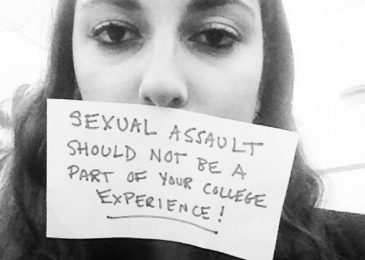I often hear personal accounts of women subject to sexual assault and rape on campuses (and elsewhere). Sometimes victims do not want to be identified either by university, or by city or town. Some women have told parents, teachers and selected friends, but do not want the authorities to become involved. Some women are afraid to identify their assailants. This has to do with the culture of silence around these crimes, and routine cover-ups by most universities.
For these reasons I have had to disguise some personal aspects of these cases, but the facts are all too real.
Here are two sobering and real stories about women university students in the Maritimes.
 Last year, at a party in a small academic department at an east-coast university, someone secretly slipped a date-rape drug into one woman student’s drink. Suddenly the woman felt dizzy and sick; through her haze she guessed what had happened. Shakily, she took out her cell phone and began to document how she felt –- as a way to focus; she hoped she would not pass out. She remembered that during the term one professor had given her a key card to a small study room, which few or no other students had been given.
Last year, at a party in a small academic department at an east-coast university, someone secretly slipped a date-rape drug into one woman student’s drink. Suddenly the woman felt dizzy and sick; through her haze she guessed what had happened. Shakily, she took out her cell phone and began to document how she felt –- as a way to focus; she hoped she would not pass out. She remembered that during the term one professor had given her a key card to a small study room, which few or no other students had been given.
Somehow that night she made it down the hall, and down the stairs. On her phone, she kept note of anything she could remember, any man who asked to help her, any man who tried to befriend her or any man who followed her from the party room. She finally made it to the study room, swiped to enter and locked herself inside. There she must have passed out. Hours later, when the drug wore off, she awoke on the floor. She was relieved at the thought she had not been sexually assaulted or raped. She knew it because she had kept the diary on her smart phone. Her last entry had been at midnight, just after she arrived in the safe room, and locked the door.
A few days later, she went to the university administration and demanded to know who had spiked her drink. The university administration made a halfhearted attempt to find the culprit or culprits. Within a couple of days the administration reported that no one had admitted spiking her drink. But the party had been a small one, with students invited from only the one department.
No faculty members were present. The university’s response not to follow up was at first tentative, then muddled and finally resigned. The young woman felt she had no recourse. After all, the administration eventually abandoned the investigation. There was the local women’s centre, but the student felt that since she did not think she had been sexually assaulted there was no point reporting. Somehow she forced herself to return to classes, knowing that someone in one of her classes, someone she knew, had drugged her with the intention of raping her. She waited out the next couple of months. She was a good student, who graduated in May, near the top of her class.
As one woman professor said, “She was brilliant; she figured out a way so they couldn’t rape her.” After graduation, the young woman left the city, and has not returned.
On a Saturday night, a party of four undergraduate women students were drinking at a downtown bar. One of the women remembers nothing of the evening. She knows only that she woke up on a bed in a strange room on Sunday morning. She was alone. Her blazer, her skirt and her underwear had been tossed on the floor. In a panic, she looked out the window – saw the street and guessed she was in a downtown hotel room. Terrified, she put on her skirt, grabbed her purse and ran out of the room down the hallway to an elevator. She left her blazer behind. From the hotel lobby, through tears she phoned her sister to pick her up.
She had been worried when the woman did not return to their apartment that night. She thought maybe she had stayed with a friend. About seven a.m. her phone call woke the sister and she drove to the hotel.
She took her sister to the hospital. The nurses there confirmed she had been sexually assaulted—probably by more than one attacker. She thought about going to the police, but decided against it.
- Of 100 women who suffer a sexual assault, only 6 report it to the police.
- Date rape drugs are everywhere; they strike fear in women. Date rape drugs mean men get to have the ultimate power and control over women.
- In 2016, the message is if you don’t want to be raped, you should stay home.
- No matter how vigilant women are, it is almost impossible to safeguard one’s drink from the time it is poured at the bar to the time it’s sipped at the table.
- Young women age 16 to 24 are four times more likely to be sexually assaulted than women in any other age group.
The woman’s drink had been spiked. She must have been headed to the washroom when someone had virtually dragged her to the hotel across the street from the bar. She probably couldn’t stand, so someone had to have taken her on an elevator up to the room. Every major hotel has security cameras – in the lobby, in the elevators and in the hallways. Every major hotel rents rooms only to those with credit cards who can show ID. It is possible to find out who did this. It is likely that the bartender or waiter at the bar was involved—after all someone must have advised her three women friends that she was sick and going home. Or something like that — otherwise wouldn’t her friends have wondered where she had gone?
For more on tracking these crimes, and women who have gone public, read Jon Krakauer’s Missoula: Rape and the Justice System in a College Town (2015).
Judy Haiven is a professor in the Management Department at Saint Mary’s University, and a social activist.




Campuses are “protected” by campus police, which means the “real” police don’t go there. Somehow the University winds up controlling public safety, a job for which they are not trained. The university has an interest in seeing that it’s name/reputation is protected. To that end they suppress news of these events and this lets the rapists & abusers go free. It’s like University campuses are “free rape zones.” We can’t expect help from the Universities. Their financial interests cause them to be obstructive and part of the problem.
I put forward a proposal at the Nova Scotia NDP Convention earlier this year that we form a committee to look into making campuses safer, and it passed. That is something that the NSNSP are obliged to act on. One of the things that I hope we’ll be considering is putting police presence back on campuses, because it’s elimination was an experiment that has clearly failed. By itself that won’t be enough, however. We need our best minds to put together a plan to see that women are safe, everywhere. part of the plan should be that there are real consequences for sexual assault so potential attackers are aware of zero tolerance for such crimes. Education of boy & young men may also form a part of a strategy, even before they get to University. This is a serious problem and we should all offer some of our time & effort to see that women on campus are safe.